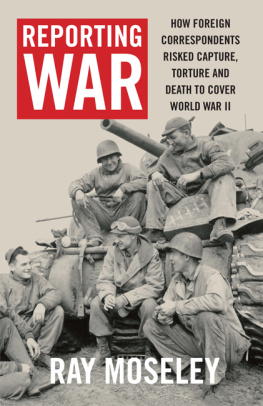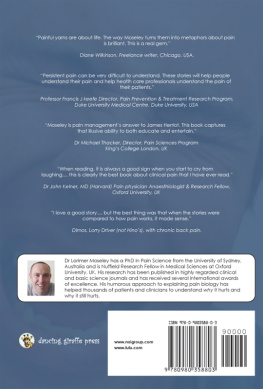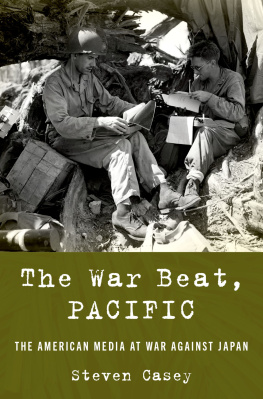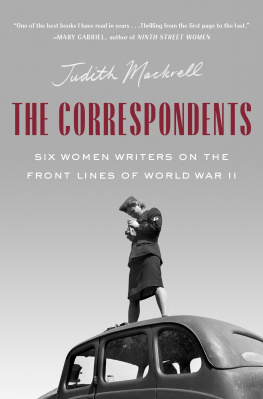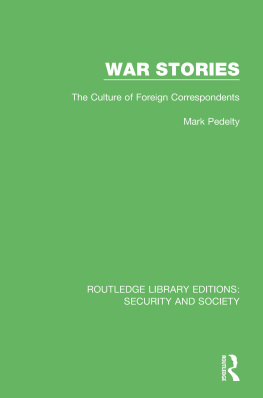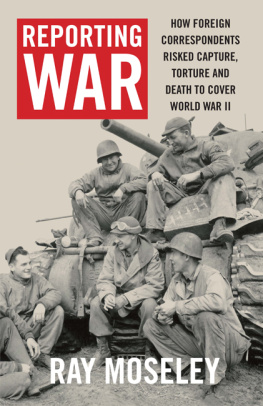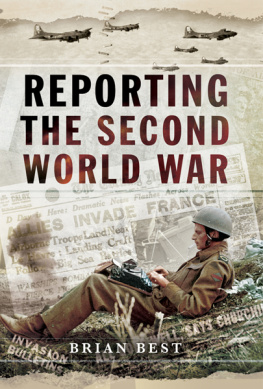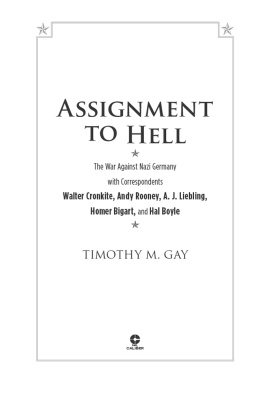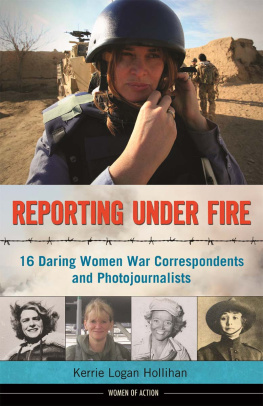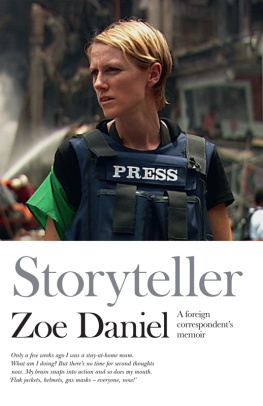REPORTING WAR

Copyright 2017 Ray Moseley
All rights reserved. This book may not be reproduced in whole or in part, in any form (beyond that copying permitted by Sections 107 and 108 of the U.S. Copyright Law and except by reviewers for the public press) without written permission from the publishers.
For information about this and other Yale University Press publications, please contact:
U.S. Office:
Europe Office:
Typeset in Adobe Garamond Pro by IDSUK (DataConnection) Ltd
Printed in Great Britain by Gomer Press Ltd, Llandysul, Ceredigion, Wales
Library of Congress Cataloging-in-Publication Data
Names: Moseley, Ray, 1932- author.
Title: Reporting war : how foreign correspondents risked capture, torture, and death to cover World War II / Ray Moseley.
Other titles: How foreign correspondents risked capture, torture and death to cover World War II
Description: New Haven : Yale University Press, [2017] | Includes bibliographical references and index.
Identifiers: LCCN 2016036163 | ISBN 9780300224665 (alk. paper)
Subjects: LCSH: World War, 1939-1945Press coverage. | World War, 1939-1945Journalists. | War correspondentsHistory20th century. | World War, 1939-1945Radio broadcasting and the war. | World War, 1939-1945Mass media and the war.
Classification: LCC D798 .M67 2017 | DDC 070.4/4994053dc23
LC record available at https://lccn.loc.gov/2016036163
A catalogue record for this book is available from the British Library.
10 9 8 7 6 5 4 3 2 1
For Caspar, Hugo and Thomas
with love
Grandpa aka Gramps
CONTENTS
PREFACE
I n 1815, as the British writer Brian Cathcart has noted, London had more than fifty newspapers. Not one of them sent a reporter to Belgium to cover the battle of Waterloo and an anxious public had to wait four days for a dispatch rider to arrive in leisurely fashion with the news of Wellingtons victory. Then one of the centurys great news stories finally saw print. All wars are different, and coverage of wars is different in each era. World War I was a newspaper war, World War II a newspaper and radio war, and Vietnam the first televised war. Censorship has varied from country to country, from one age to another. Problems for correspondents in reaching filing points, causing serious delays in the reporting of battles that had moved on, remained more or less constant until the time of the first Gulf War, when satellite phones appeared on the battlefronts. Correspondents in all wars have faced the threat of death, but the conflict in the former Yugoslavia marked the first time, in my own experience, that cars clearly marked with large PRESS or TV lettering were sometimes deliberately fired upon. Only since the rise of Islamic State have captured correspondents been beheaded. And only in the past few years have foreign correspondents constituted an endangered species, with many newspapers and broadcasters axing all or nearly all of their foreign staffs.
The years since World War II have witnessed a remarkable and recently escalating number of wars, some of which I covered as a wire-service and newspaper correspondent, but the 193945 conflict remains the one most firmly rooted in my consciousness. I was a child of 12 when that war ended and, like most American boys at the time, I was enthralled by the shifting fortunes of battle and remained glued to radio reports. But, as far as I can recall, I was little aware of newspaper dispatches. Soon after the war ended, I read Brave Men, a compilation of war reports by Ernie Pyle, the most famous American print journalist of the conflict, and that stimulated an enduring fascination with war history as well as a budding interest in a career in journalism.
The genesis of this book came in 2011 when I read The End, a brilliant analysis of the collapse of the Nazi regime in 19445 by the British historian Ian Kershaw. Midway through the book, I began to wonder how Western correspondents in Moscow, where I was once based, had managed to cover the fighting in Stalinist Russia. Had they been able to sift the truth from the Communist governments propaganda? Had the regime allowed them to visit battlefronts? How rigorously had their reporting been censored? These questions soon led to a broader curiosity about coverage throughout the world, then about the lives and personalities of those involved. Some of the correspondents were men and women whose names were familiar to me, but most of the characters who emerged from my research were not. By and large, I thought the American correspondents came off reasonably well, and some performed superbly. But the greatest surprise was discovering that some of the best reporting, and writing, of the war came from five Australians. Four of them hailed from one city, Melbourne.
I wanted the book to encompass as many nationalities as possible, with this exception: German and Japanese correspondents have been excluded because no independent reporting was possible in those countries. The same was true of French journalists working under Nazi occupation; the only French correspondent included in the book reported for an American newspaper. One correspondent from Fascist Italy is included; he was anti-fascist and, although something of a fantasist, produced some insightful reporting as he followed German troops into the Soviet Union.
Why write about them at all, some may ask? Because it provides a fascinating glimpse into an event of immense historical importance and, for those who care about such things, the history of journalism. Their reporting and personal experiences offer a perspective that does not often appear in conventional histories, and valuable insights into how people cope under extraordinarily hazardous circumstances.
My narrative has been arbitrarily limited to a select number of journalists from the United States, the United Kingdom, Canada, Australia, the Soviet Union, South Africa, Denmark, Sweden, Italy and Francejust one each from the last five countries. Those interested in reading about the experiences of photographers and newsreel cameramen will have to look elsewherewith two exceptions: Lee Miller and Carl Mydans were photographers, but also reporters and first-class writers, so they are included.
A final, personal note: in my own career as a foreign correspondent from 1961 to 2001, which encompassed several wars, I encountered fourteen of the World War II crowd and became friends with a few of them. Not one ever mentioned his or her wartime experience, nor did I ask. Perhaps this book will make some amends for that lack of curiosity on my part.
ACKNOWLEDGMENTS
T he list of people whom I have to thank for their help in bringing this book to completion is not extensive but my gratitude to them is endless. I owe a special debt of thanks to Robert Baldock, my editor at Yale, who launched my career as an author with Mussolinis Shadow in 1999 and welcomed my latest offering with the kind of enthusiasm he previously showed for my work. His interest and encouragement have always bolstered my spirits. With consummate professional skill, Rachael Lonsdale at Yale played the principal role in putting this book together for publication, and working with her was always a pleasure. Sophie Richmond saved me from a number of errors with her careful editing.
My son John, a more talented writer than his dad, read early chapters and contributed important suggestions for improvement, as well as encouragement to keep going. A number of friends, all of them writers and some with their own experience of reporting from far-flung outposts including war fronts, generously undertook the chore of reading every word with critical eyes, much to my profit. They include James Burke, Robin Knight, Alex Frere, Gerry Loughran and Jimmy Barden. Pat McCarty helped supply research material. Charles Glass learned of the book at a late stage and became one of its most ardent champions. Thanks are also due to Roy Reed, Ernie Dumas and Richard Longworth for promoting my cause. My daughter Ann and son-in-law Clive Jones had other priorities during the birth of this bookthe birth of my grandsons Caspar and Hugo. But they cheered me on, along with other family members and friends.
Next page
